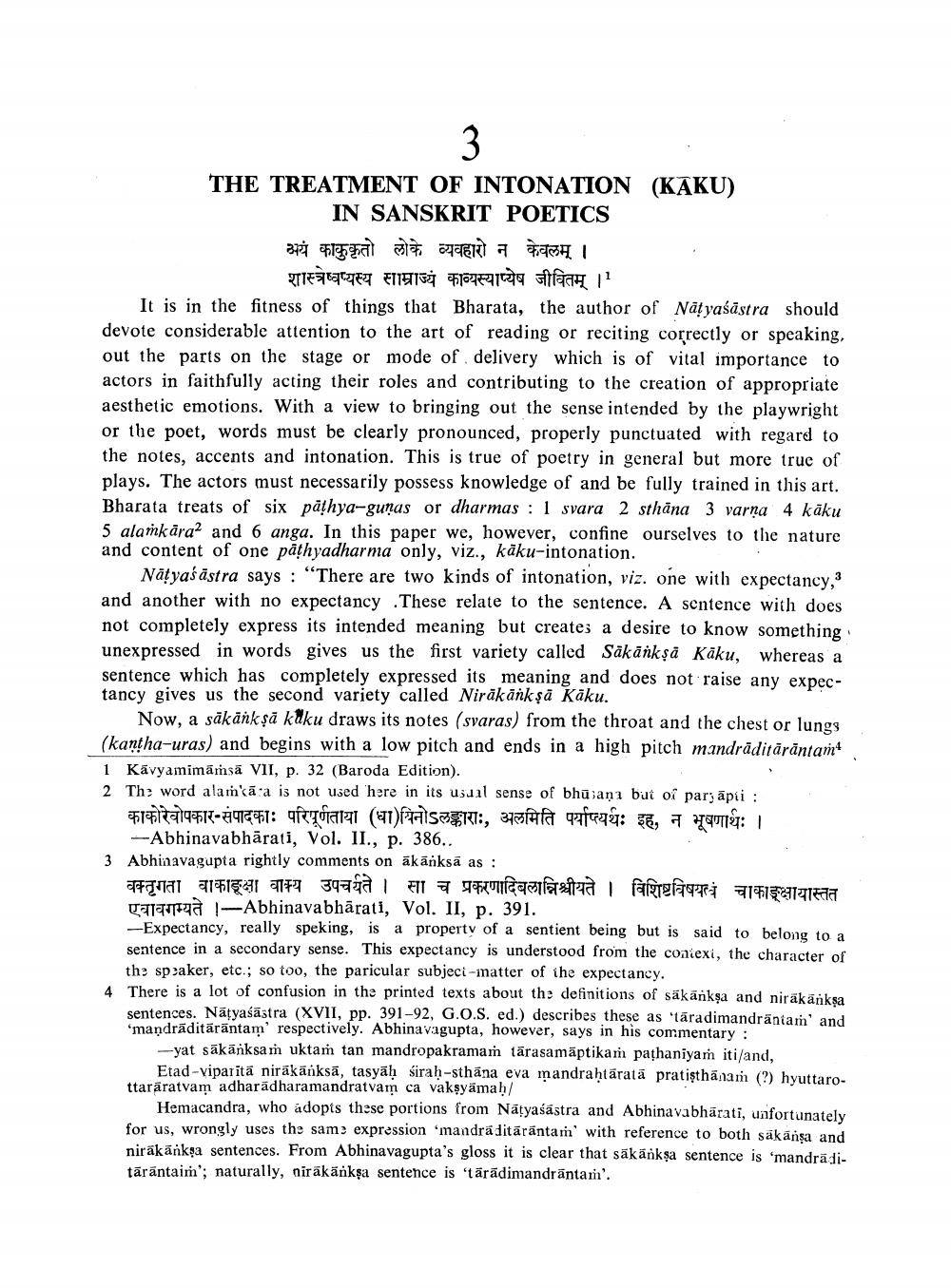________________
THE TREATMENT OF INTONATION (KAKU)
IN SANSKRIT POETICS अयं काकुकृतो लोके व्यवहारो न केवलम् ।
शास्त्रेष्वप्यस्य साम्राज्य काव्यस्याप्येष जीवितम् ।। It is in the fitness of things that Bharata, the author of Nātyaśāstra should devote considerable attention to the art of reading or reciting correctly or speaking, out the parts on the stage or mode of delivery which is of vital importance to actors in faithfully acting their roles and contributing to the creation of appropriate aesthetic emotions. With a view to bringing out the sense intended by the playwright or the poet, words must be clearly pronounced, properly punctuated with regard to the notes, accents and intonation. This is true of poetry in general but more true of plays. The actors must necessarily possess knowledge of and be fully trained in this art. Bharata treats of six păthya-guņas or dharmas : 1 svara 2 sthāna 3 varna 4 käku 5 alamkāra2 and 6 anga. In this paper we, however, confine ourselves to the nature and content of one pathyadharma only, viz., käku-intonation.
Nāțyaśāstra says : "There are two kinds of intonation, viz. one with expectancy,3 and another with no expectancy. These relate to the sentence. A sentence with does not completely express its intended meaning but creates a desire to know something unexpressed in words gives us the first variety called Sākānkså Käku, whereas a sentence which has completely expressed its meaning and does not raise any expectancy gives us the second variety called Nirākānkṣā Kāku.
Now, a sākānk şā kūku draws its notes (svaras) from the throat and the chest or lungs (kantha-uras) and begins with a low pitch and ends in a high pitch mandrāditārāntam* 1 Kävyamimāṁsā VII, p. 32 (Baroda Edition). 2 Th word alam āra is not used here in its usual sense of bhūsaņı but of parjāpii :
काकोरेवोपकार-संपादकाः परिपूर्णताया (धा)यिनोऽलङ्काराः, अलमिति पर्याप्त्यर्थः इह, न भूषणार्थः ।
-Abhinavabhārati, Vol. II., p. 386.. 3 Abhinavagupta rightly comments on ākānksā as :
वक्तृगता वाकाक्षा वाक्य उपचयते । सा च प्रकरणादिबलान्निश्चीयते । विशिष्टविषयत्वं चाकाङ्क्षायास्तत Ulaza -Abhinavabhārati, Vol. II, p. 391.
-Expectancy, really speking, is a property of a sentient being but is said to belong to a sentence in a secondary sense. This expectancy is understood from the coniexi, the character of th; speaker, etc.; so too, the paricular subjeci-matter of the expectancy. There is a lot of confusion in the printed texts about the definitions of säkänkșa and niräkänksa sentences. Natyaśāstra (XVII, pp. 391-92, G.O.S. ed.) describes these as 'taradimandräntar' and *mandräditārāntam' respectively. Abhinavagupta, however, says in his commentary :
vat sākānksam uktar tan mandropakramam tarasamäptikam pathaniyam iti/and. Etad-viparitā niräkänksā, tasyāḥ sirah-sthāna eva mandrahtārata pratişthānam (?) hyuttarottaräratvam adharādharamandratvam ca vakşyämah/
Hemacandra, who adopts these portions from Natyaśāstra and Abhinavabharati, unfortunately for us, wrongly uses the sam: expression 'mandra ditārantam' with reference to both säkänşa and niräkānkņa sentences. From Abhinavagupta's gloss it is clear that säkänksa sentence is mandräditäräntaim'; naturally, niräkānkşa sentence is 'tärādimandräntan'.




